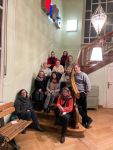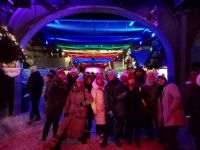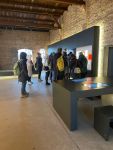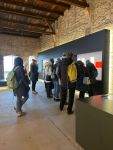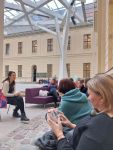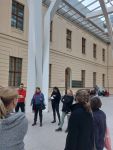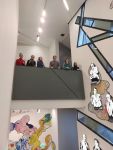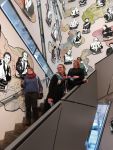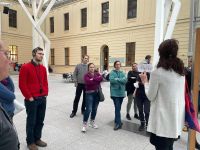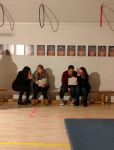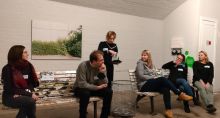
On 12-14.12.2022. Some of the staff of our Foundation (mainly the pedagogical departments) went on a study visit to Berlin. During three intensive days, the team visited a number of institutions and museums where they could draw inspiration for their own projects. In each of the places visited, the guided tours were focused on pedagogical aspects and the substantive preparation of the exhibitions. This is of particular value because of the exhibition on World War II that the Foundation is preparing.
On Monday we visited:
→ Jüdisches Museum Berlin - Jewish Museum Berlin
https://www.jmberlin.de/
In addition to a guided tour of the Museum, there was a meeting with the pedagogical department. The concepts and methods used to work with children and young people and the principles of long-term educational programs were presented. An important element of the Museum's strategy is its activities to include children and young people who have fewer opportunities to participate in culture and those with learning disabilities or disabilities. Therefore, interesting examples of their activities were the mobile exhibition and online programs.
→ 7xJung - Dein Trainingsplatz für Zusammenhalt und Respekt (Ausstellung von Gesicht Zeigen)
https://www.7xjung.de/
At the workshop center, Foundation employees were able to participate in a series of workshops focused on countering racism and discrimination. Each of the rooms in which the workshops are held is prepared so that a group of children and young people can be conducted. During the meeting, participants were introduced to the mechanisms of discrimination, as well as how to counter them, and the pedagogical basis of the workshop was deepened.
On Tuesday:
→ Plötzensee Memorial
https://www.gedenkstaette-ploetzensee.de/
A place of particular importance to the history of the Krzyzowa Foundation. It was there that the Nazis executed members of the Krzyzowa circle, among whom were Helmut James von Moltke and Peter Graf Yorck von Wartenburg.
→ Jugend Museum (Youth Museum) - Exhibition Villa Global
https://www.villaglobal.de/
The Jugend Museum, especially aimed at young people, has adopted an unprecedented and very authentic form of elaboration and presentation of the issue, which is cultural diversity among Berliners. During their visit, visitors can take on the role of either journalists or detectives who conduct information gathering on the people who live in Villa Global. To do this, small teams visit specially prepared rooms so they can discover the daily lives of people from different countries living in Berlin's Schöneberg district. From a pedagogical angle, an important part of working with a group of young people is to discuss and draw conclusions based on the information observed.
And on the last day on Wednesday:
→ Anne Frank Center in Berlin
https://www.annefrank.de/
The exhibition on Anne Frank was renovated and reopened in November 2018 and developed around the concept of discrimination. A great effort was made to make the center as accessible as possible to everyone. In addition to the exhibition section on the life of Anne Frank, the interactive workshop section has proven to be very inspiring, making it possible to integrate Anne Frank's story into the life experiences of today's youth.
→ Dokumentations Zentrum = Flucht, Vertreibung, Versöhnung
https://www.flucht-vertreibung-versoehnung.de/de/kennenlernen/dokumentationszentrum
The last point on the Berlin map was the Documentations Center, which was guided by curator David Ziemer. Again an important place for the Foundation, this time because of the history of Lower Silesia, as the Center focuses on the history of population displacement after World War II. In addition to the historical part, where it was particularly important to look at the German and Polish perspectives on those events, the section on population migration in a more general context was also interesting. Deepening this knowledge helps to better implement the programs carried out by the Krzyzowa Foundation.
Die Aktivität wird aus Mitteln des NIW-CRSO im Rahmen des Programms zur Förderung der Entwicklung internationaler Begegnungsstätten 2021-2030 finanziert.


